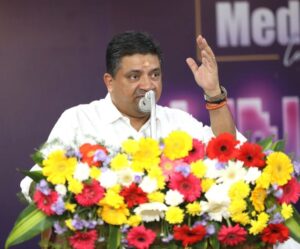
Chennai: Technology has fundamentally reshaped the media landscape, making it more accessible, dynamic, and democratised, said Minister for Information Technology and Digital Services Palanivel Thiaga Rajan (PTR). Addressing the ‘Media Futures Conference Series’ at the University of Madras on Friday, the minister highlighted both the transformative potential and the risks posed by artificial intelligence (AI) in media.
The conference, jointly organised by the Department of Journalism and Communication, University of Madras, and RandomWalk, focused on the theme “AI in Media: Navigating the Future of Creativity, Communication, and Innovation.”
Speaking at the event, PTR acknowledged the many positive disruptions AI has brought to the media industry.
“We have seen what AI can do; it can be creative, and it has the capability to be augmentative. It enhances the performance of individuals and companies by providing a supporting mechanism,” he said. He emphasised that AI-driven tools can increase efficiency, automate tasks, and even contribute to new forms of storytelling and content creation. However, he also cautioned against the unregulated use of AI, particularly in the realm of content personalisation.
While acknowledging AI’s benefits, PTR raised concerns about its ability to create highly individualised content experiences.
“Systems that continuously analyse human behaviour and tailor content accordingly run the real risk of fragmenting society even further by reinforcing long-held perceptions and stereotypes,” he warned.
He pointed out that social media has already contributed to the creation of echo chambers, where individuals are exposed only to opinions and perspectives that align with their own. With AI’s ability to micro-target and micro-manage content at an unprecedented scale, he expressed concerns that it could erode the foundation of democratic discourse.
“AI’s near-infinite ability to personalise content may be antithetical to the best interests of a democratic society, which thrives on dialogue, dissent, and eventual consensus,” he added.
The minister’s remarks come at a time when AI-driven technologies, including automated news generation, deepfake content, and algorithmic curation, are reshaping the media landscape. While AI can enhance news dissemination, data analysis, and fact-checking, it also raises ethical questions about bias, misinformation, and the erosion of journalistic credibility.
The conference saw participation from academicians, journalists, media professionals, and AI experts, all of whom discussed the evolving role of AI in shaping the future of communication and media ethics.

